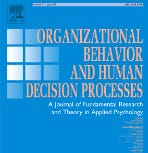Chronic monitoring for wrongdoing as a signal of immoral character
Nathan A. Dhaliwal, Fan Xuan Chen, Jane O’Reilly, Karl Aquino
https://www.sciencedirect.com/science/article/abs/pii/S0749597825000147
Punishing wrongdoing can sometimes have reputational benefits for the “punisher.” Taking action when others make mistakes can signal that the punisher is concerned with enforcing norms and fostering group cooperation. But what do people think of those who regularly monitor their environment for signs of wrongdoing? Drawing on the concept of workplace vigilantism, the authors posit that chronic monitoring in workplace settings serve as negative cues of a person’s moral character. They propose that chronically monitoring for signs of wrongdoing signals that the monitor is driven by retribution motives (punishment rather than rehabilitation) and competitive-leveling motives (“bringing down” others to elevate one’s self). Chronic monitoring also signals to others that the person has a tendency to ascribe hostile motives to others. The authors examine this idea across six main studies and three supplementary studies. Their results suggest that chronic monitoring has a consistently negative impact on the reputation of the “punisher” across a range of outcomes and contexts. Taken together, their results demonstrate that when a “punisher” is perceived to be hyper-vigilant of wrongdoing, their punitive actions negatively impact their reputation rather than benefitting it.
P.S. if you can’t access the full-text let us (m-kouchaki@kellogg.northwestern.edu or mikebaer@asu.edu) know and we’d be happy to share a copy.


